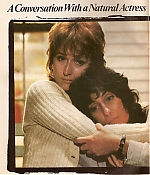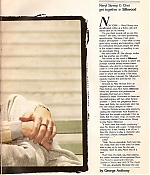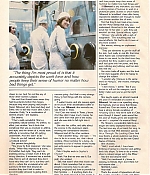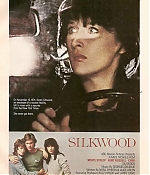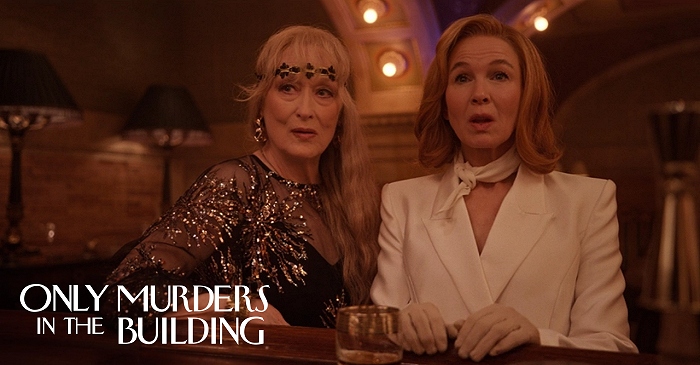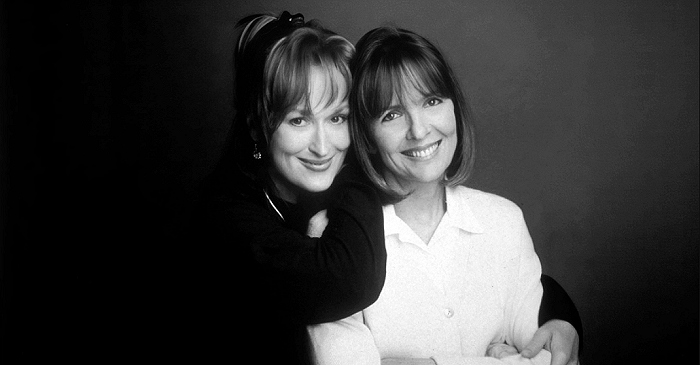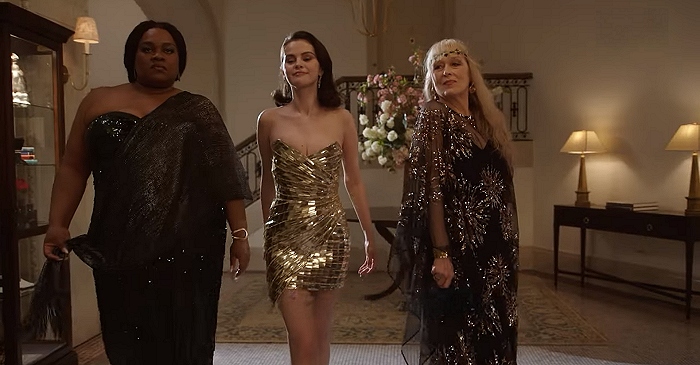|
Simply Streep is your premiere online resource on Meryl Streep's work on film, television and in the theatre - a career that has won her acclaim to be one of the world's greatest living actresses. Created in 1999, Simply Streep has built an extensive collection over the past 25 years to discover Miss Streep's body of work through thousands of photographs, articles and video clips. Enjoy your stay and check back soon.
|
|
A conversation with a natural actress
Marquee Magazine ·
December 1983
· Written by George Anthony
| ||
|
Tags
|
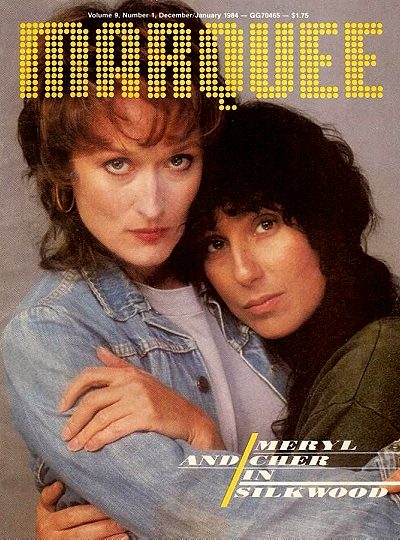
New York – Meryl Streep sips decaffinated coffee at a Soho cage and stares back at me intently. “Do you think people will go see this movie?” she aks, her eyes questioning, apprehensive. “Because I feel, given today’s atmosphere – I feel what’s a very good story, moving and interesting, might be overlooked because people are afraid of the subject matter, or unwilling to see an apocalyptic thing…” Her voice trails off. She shrugs, smiles and has another sip of her coffee.
The movie on her mind is “Silkwood”, the controversial new drama in which she portrays nuclear factory worker Karen Silkwood, who died in a mysterious car crash in 1974 while she was attempting to expose the dangers in the plutonium plant in which she worked. If her story sounds familiar, it should; Ms. Silkwood’s exploits inspired the premise for “The China Syndrome”.
Directed by Mike Nichols from an original script by virgin screenwriters Nora Ephron and Alice Arlen, “Silkwood” traces the personal and professional struggles that lead up to Katen Silkwood’s death. Prominent in these are her relationships with two other factory workers – Drew, her gegarious live-in lover, and Dolly, her roomate, who has her own sexual designs on Karen. Director Nichols scores extra poins by casting the charismatic Kurt Russell as Drew and the equally enigmatic Cher as Dolly. But his major coup, of course, was convincing double Oscar-winner Streep to play Karen Silkwood. “It didn’t take that much convincing,” says Ms. Streep with a grin. “I really loved playing her. It was, frankly, a lot of fun. I liked the chance to play a character who was more, y’know, colloquial than, ummmm…” Lofty? “Yeah. Not so vereable. And more like me, really, than any of the ones I’ve been able play up to now. So she was certainly easier to play. Much less of a task.”
Much less of a task, say, than playing the classic heroines of her previous films: “The French Lieutenant’s Woman”, “Sophie’s Choice” and “Still of the Night”. “Oh yes, absolutely. Because she was closer to me. And I’m not like any of those other women I played.” She and Kurt Russell were aware they had boundaries before they began, because they were playing real people – Karen Silkwood, who lived and dies, and Drew, who is still very much alive. Cher’s character Dolly, “Is a combination of several people,” she explains. She beams. “Cher’s really wonderful. She’s a completely natural actress. No artifice, no effort, just intuitive. You’d think that somebody that was so involved in artifice and style, and the sheen of it, would have difficulty in knocking that off, getting underneath. And she didn’t at all.” How do you tell “natural” actors from un-natural actors? She pauses thoughtfully. “You know by their response,” she says slowly. “When they respond to a scene, it’s truthful. And right. They can’t do anything wrong, or false. Even if they get the wrong direction, if someone has a terrible idea; they’re sort of stymied; they don’t know why they can’t do it, but they can’t do it – where the un-natural actor will just try to fit their face around an emotion they don’t feel in order to accomodate whoever is giving them direction.”
“Cher just felt things – with the camera going. And that’s a very strange thing, to feel things with the camera going.” A waiter hovers and she pauses again as he pours fresh, decaffinated coffee in to her cup. “Silkwoo” she reminds me, was filmed in Texas. “And Cher was raised in Texas, y’know. And they didn’t have much money. So she came from that part of the world, and she was able to fall right into it again.” She stirs coffee, and talks about the scenes in the plutonium plant, showing the camaraderie between Silkwood and all the other workers. “That’s another thing,” she says – “it’s nice to be in a movie, too, that’s about working. About working for a living. As opposed to a lot of movies where money just sorta seems to appear in people’s pockets.” Didn’t Sophie work in “Sophie’s Choice?” “Yeah. Not that we ever saw. But yeah, she worked. Still, that wasn’t what that movie was about, I think nowadays that so many people’s concerns have to do with staying employed an dhow to provide for their families… if anything that’s the thing I’m most proud of in this movie, is that it accurately decipts the work force and how people keep their sense of humor no matter how bad things get.” If “Silkwood” is any indication, you need a strong sense of humor to work in a plutonium plant. Scenes in which Karen Silkwood is ‘scrubbed’ clean after being exposed to radiation are enough to make you choose another line of work. Not that they’d ever treat a big movie star like Meryl Streep that way, you understand; throw her in the shower, and scrub her ’til her skin – well, they just wouldn’t do that. Special effects, right? “Wrong,” she admits with a sigh of resignation. “The scrubbing was not special effects. We had to do it more or less from the scratch.” She winces, reliving an unpleasant memory. “They use abrasives to get the stuff off the skin. And really, in real life, that time when Karen was contaminated three times in one week, by the third time they scrubbed her they couldn’t get it, the stuff had gone into her pores, and they were rubbing and rubbing, and her skin was real raw…”
Her voice trails off again, and the look in her eyes suggests she’d be happy to change the subject. “I wonder why Marquee is the same word as Marquis,” she muses, changing it herself. “I don’t know,” I admit. “But if you decide to roll out the marquees, you’d better make sure you’ve got the right one.” She laughs again, an almost musical thrill and I’m reminded of a scene in “Silkwood”. We see a car speeding along a highway, and we know that Streep, Russell and Cher are inside it, and we hear a strong female vocalizing of “Amazing Grace”. And we’re sure it’s Cher, even though it doesn’t quite sound like her, and we finally get to see inside the car and – surprise, it’s musical Meryl. Ms. Streep’s considerable talents as a singer are rarely displayed these days. The last time any of us heard her sing, in fact, was on that PBS television special, “Alice Through the Looking Glass”. And now there’s a whole audience out there who think of her role as the new Grand Dame of Drama. She chuckles.
“Well, I must admit, I have been thinking of going to a teacher and getting back into shape. I’d love to do a movie about a cabaret singer set in the fities.” Has she told anyone else? “Well, I’ve mentioned it, y’know, in passing, to friends. But I don’t think I’ve told anyone else…” Shhhhh, Listen. Hear that? That’s the sound of typewriters all over the country, pounding out the next Meryl Streep movie.


Posted on October 14th, 2025
|
Posted on October 11th, 2025
|
Posted on September 30th, 2025
|
Posted on September 16th, 2025
|
Posted on September 9th, 2025
|




